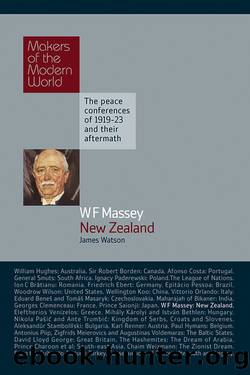William Massey by James Watson

Author:James Watson [Watson, James]
Language: eng
Format: epub
Tags: Nonfiction, History, Australia & Oceania, Biography & Memoir, Political
ISBN: 9781907822193
Google: Mn_ijwEACAAJ
Publisher: Haus Publishing
Published: 2011-04-19T04:00:00+00:00
Samoa
The first issue of prime importance to New Zealand, the disposal of Germanyâs colonies, came up early at the Peace Conference. Woodrow Wilson envisaged that all such colonies should become mandates under the League of Nations rather than simply possessions of the powers that occupied them. When ex-President William Howard Taft publicly advocated such a policy, it was attacked by supporters of Masseyâs Government as âpreposterous ⦠absurd and impracticableâ.26
Massey joined with Hughes and with Botha of South Africa in rejecting proposals for League of Nations control over the Pacific Islands and South-West Africa. In discussions on the Supreme Council (âThe Council of Tenâ â Prime Ministers and Foreign Ministers of the âBig Fourâ and Japan) on 24 January, it was rapidly decided that the colonies would not be returned to Germany. Lloyd George, who had placed the item on the agenda, expressed support for the annexation of the German territories occupied by Australia, South Africa and New Zealand, but left it to their leaders to argue their cases against control by the League of Nations.
Massey spoke last. Unlike Hughes and Botha he did not specifically call for annexation to the occupying Dominion, preferring instead the ambiguous formulation that the island [sic] should be allowed to remain under British control. Possibly fearing that the Americans would press for some sort of condominium over Western Samoa, with themselves as one of the powers entrusted with its care, Massey referred to what he saw as the failure of the British-French condominium in the New Hebrides. He argued that his call for annexation was based on the strategic importance of Western Samoa to New Zealand and represented a reward for its sacrifices in wartime. He maintained that âa confidential plebiscite was taken by the New Zealand administration among the Samoan chiefs and native leadersâ and that it revealed âan overwhelming preference in favour of British rule and condemnation of the Germansâ.27 This information seems to have been given to him before he left New Zealand. When Massey was in London to attend the Imperial Conference in 1918, he had received a letter from Allen commenting on an address given by Western Samoans to their Administrator, Colonel Robert Logan, when he was made a Companion of the Bath. Allen declared that âThe address leaves no room for doubt as to the genuineness of their desire to remain under our flag.â28 Logan had then reported in December 1918 that the chiefs there were âunanimousâ in their support for British rule.29 In the circumstances this would have been interpreted as New Zealand rule.
There had been causes for discontent during the war. The diversification of Western Samoaâs agricultural production begun by the Germans had been stopped in favour of dependence on copra, and the existing commercial estates were seized and allowed to run down. Taxes were increased to pay for an expanding bureaucracy and recognition of local customs and customary authorities was reduced. However, the most authoritative text dealing with the experience of wartime Western Samoa concludes that a majority of the population did favour continued âBritishâ rule in late 1918.
Download
This site does not store any files on its server. We only index and link to content provided by other sites. Please contact the content providers to delete copyright contents if any and email us, we'll remove relevant links or contents immediately.
The Memory Code by Lynne Kelly(2401)
Schindler's Ark by Thomas Keneally(1884)
Kings Cross by Louis Nowra(1797)
Burke and Wills: The triumph and tragedy of Australia's most famous explorers by Peter Fitzsimons(1426)
The Falklands War by Martin Middlebrook(1383)
1914 by Paul Ham(1345)
Code Breakers by Craig Collie(1252)
A Farewell to Ice: A Report from the Arctic by Peter Wadhams(1248)
Paradise in Chains by Diana Preston(1247)
Burke and Wills by Peter FitzSimons(1237)
Watkin Tench's 1788 by Flannery Tim; Tench Watkin;(1232)
The Secret Cold War by John Blaxland(1213)
The Protest Years by John Blaxland(1205)
THE LUMINARIES by Eleanor Catton(1196)
30 Days in Sydney by Peter Carey(1160)
Lucky 666 by Bob Drury & Tom Clavin(1155)
The Lucky Country by Donald Horne(1140)
The Land Before Avocado by Richard Glover(1119)
Not Just Black and White by Lesley Williams(1085)
